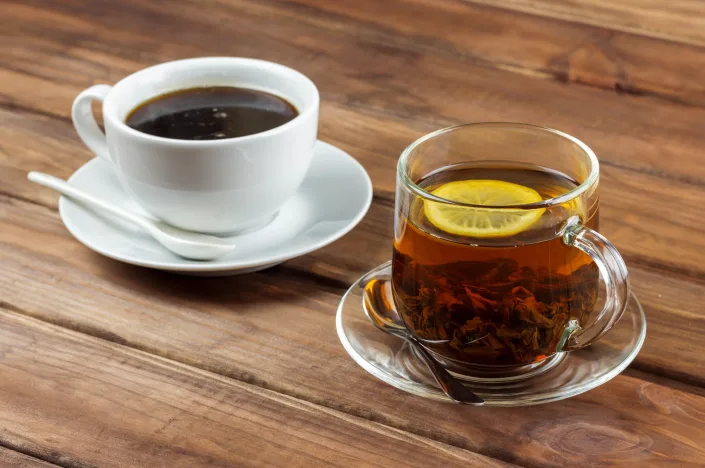Tea and coffee are both good sources of antioxidants and caffeine, but which one is better for you?

For many of us, starting the day with a drink is an essential morning ritual. While some people may choose a beverage such as orange juice or plain water, most will opt for tea or coffee. After all, these beverages are among the most widely consumed in the world. Even the act of drinking each offers its own unique experience. But when it comes to health and wellness, is one better than the other? To find out, we talked to a registered dietitian to find out which beverage comes out on top.
Related: 10 Foods to Eat for a Healthy Life
The Health Benefits of Tea
Now, it’s worth mentioning that there are hundreds of types of tea. But in general, tea is a very nutritious beverage, especially when consumed regularly. First of all, it is rich in antioxidants. Quick review: According to Harvard T.H., antioxidants are beneficial molecules that protect the body from free radicals. Chan School of Public Health. Free radicals are unstable atoms that, when present at high levels, can lead to oxidative stress. Over time, oxidative stress can damage cells and lead to chronic diseases such as heart disease and cancer – but consuming large amounts of antioxidants, such as those found in tea, may reduce your risk. Green and black teas are especially rich in antioxidants called polyphenols, says Kelsey Lorencz, registered dietitian and founder of Graciously Nourished. Even herbal teas such as peppermint and chamomile contain antioxidants, albeit in smaller amounts.
Both green and black teas also contain moderate amounts of caffeine, about 47 milligrams and 28 milligrams per 8-ounce cup, respectively. Caffeine has a refreshing effect; whether you’re heading to work or taking care of household chores, it helps to start the day off right. In addition, according to a 2021 article in the journal Nutrition, caffeine supports cognitive functions such as learning and memory. Get this: caffeine itself is an antioxidant, which means it protects cells from oxidative stress, further adding to the health benefits of tea.
Health Benefits of Coffee
Coffee, like tea, is rich in antioxidants. It’s best known for its high content of chlorogenic acid, an antioxidant compound that protects against oxidative stress, says Kerry Hackworth, a registered dietitian with the National Dairy Council. Chlorogenic acid also has anti-inflammatory and neuroprotective properties that could potentially play a role in delaying chronic disease. In fact, drinking coffee may reduce the risk of neurodegenerative diseases such as dementia and Alzheimer’s disease. In addition, registered dietitian Maddie Pasquariello, MS, RDN, says the brew may help slow the muscle loss associated with aging.
When it comes to caffeine? You can’t go wrong with coffee. There’s more caffeine in the brew than in tea, which may be ideal if you have a high tolerance for the substance. According to the Mayo Clinic, an 8-ounce cup of brewed coffee contains 96 milligrams of caffeine. That’s more than twice as much caffeine as in black tea and four times as much as in green tea.
So, which is healthier: tea or coffee?
It depends. Both tea and coffee have significant health benefits for the body, and both beverages can be part of a healthy diet. Therefore, the “best” option depends on what is most important to you.
For example, if it’s the antioxidant you’re looking for, then either drink can check that box. However, if you are looking for something to relieve nausea, then a cup of hot tea is more likely to serve the purpose. It also depends on how you prepare each drink. For example, if you want or need to limit too much sugar, then drinking any kind of drink with sweeteners may not be right for your situation.
Another factor to consider is the caffeine content of each beverage and how your body reacts to caffeine. Keep in mind that coffee has two to four times more caffeine than tea – so if you’re sensitive to the substance, tea may be a better choice, Lorencz says. Or, if you can tolerate caffeine but find that coffee makes you nervous, you’re better off drinking matcha (a type of green tea) or black tea because they’re lower in caffeine, Pasquariello notes. In addition, time of day is important. “Caffeine has a long half-life, [meaning] it stays in your system for hours after you drink it,” Pasquariello says. So if you drink coffee or caffeinated tea in the afternoon, you may feel stressed at bedtime. This can disrupt your ability to get quality sleep, which can be unhealthy and stressful for your body.
Most importantly, think about your own personal health issues. Certain medications and medical conditions, such as irritable bowel syndrome, may not be suitable for high amounts of caffeine. This means you may need to limit or not drink caffeinated beverages, such as coffee. Similarly, if you’re trying to get pregnant, currently pregnant or breastfeeding, you’ll need to limit your caffeine intake, Hackworth notes. This may mean drinking a certain amount of coffee or tea



